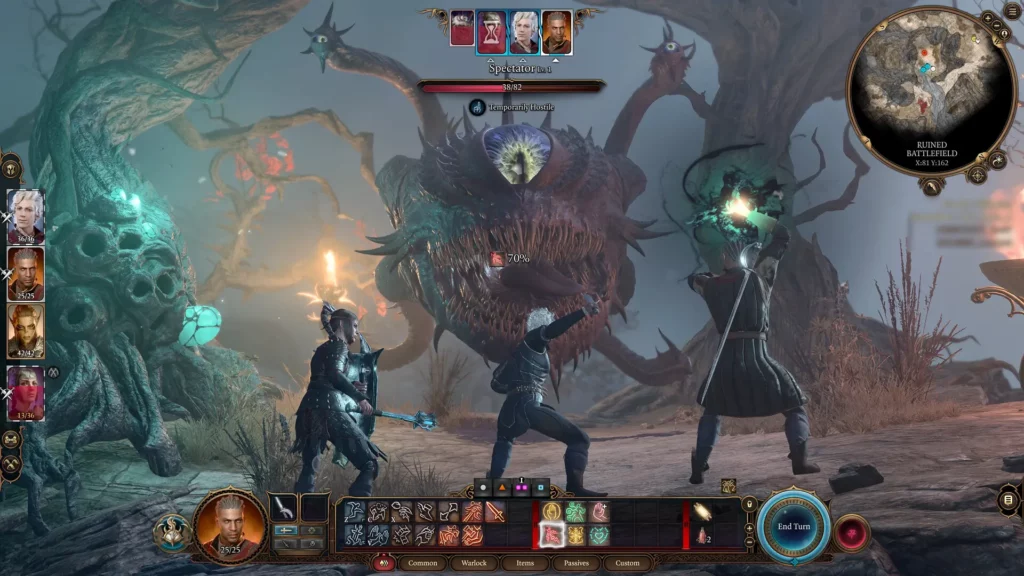Embarking on the quest of localizing role-playing games (RPGs) unveils a realm of localization challenges, each adding layers to the narrative, characters, and settings. To better understand the impact of video game localization, let’s explore the common hurdles and solutions within the RPG genre.
About Role-Playing Games
RPGs grant players control over characters navigating meticulously crafted worlds. Encompassing diverse genres, from fantasy realms to medieval landscapes, RPGs boast rich lore, unique cultures, and languages. Translating these elements extends beyond mere words, involving the delicate capture of each world’s atmosphere, nuances, and internal logic. Examples like Baldur’s Gate, The Witcher, and Fallout exemplify the vast variety within this genre.

Localization Challenges
These are the issues that RPG games most often run up against.
High word volume
RPGs involve a lot of words thanks to a high number of dialogues, narratives, and detailed descriptions for abilities and items. Project managers play an important role, especially with tight deadlines and multilingual scenarios, ensuring careful and efficient handling of queries.
Consistency
Given the plot-centric nature of RPGs, or when the story connects with a previous one, it’s crucial to keep consistency with the help of terminology management throughout the entire game. This ensures a seamless experience for players.

Context
Ensuring the localization team has visual references is essential, especially when dealing with objects. This is particularly relevant for games that involve translating extensive lists of items, where context plays a significant role. An example of the need for contextual imagery is the ambiguity of a term like “deck.” Without accompanying visuals, one might confuse a ship’s deck with a deck of cards. This highlights the important role that images play in aiding localizers by clearly distinguishing and providing the necessary context for terms that may have multiple meanings. Thus, integrating visuals with text becomes essential for ensuring clarity and precision in these types of games.

When adapting place names, creature descriptions, and in-game currencies, it’s essential to strike a balance between staying true to the original and ensuring cultural resonance for players in diverse regions.
Adapting character creation options
In RPGs, players often have the freedom to create their own heroes by selecting races, classes, and backgrounds. Certain fantasy races or character types may not be familiar in certain regions, prompting localizers to provide culturally relevant alternatives or modify descriptions to better connect with diverse audiences.

Storytelling
In RPGs, compelling narratives and impactful dialogue are essential elements. Localizing these games involves capturing the characters’ voices, emotional moments, and humor, all while maintaining clarity and a smooth flow. To keep the humor intact, jokes, puns, and pop culture references might require creative solutions to preserve their impact. Translating dialogue choices that have significant consequences must be done with precision to uphold player agency.
Navigating cultural sensitivity
RPGs frequently delve into themes and confront players with challenging decisions. Adapting these elements for different regions involves a thoughtful examination of cultural variations and historical context to prevent inadvertent sensitivities or inaccuracies.
Certain aspects of the plot or interactions between characters may necessitate modifications in specific regions to ensure respectful representation and consideration for cultural values.
The takeaway
In RPG games, where every detail contributes to a rich story and setting, the localization team’s comprehensive understanding of the game’s lore and universe is essential. This knowledge enables the team to make informed decisions on how to adapt content so that it resonates with players from different cultural backgrounds, while still staying true to the game’s core identity. Being open to creativity and transcreating some elements plays a vital role in maintaining the depth and richness too. When localizing an RPG game, a streamlined workflow and effective communication is key.
